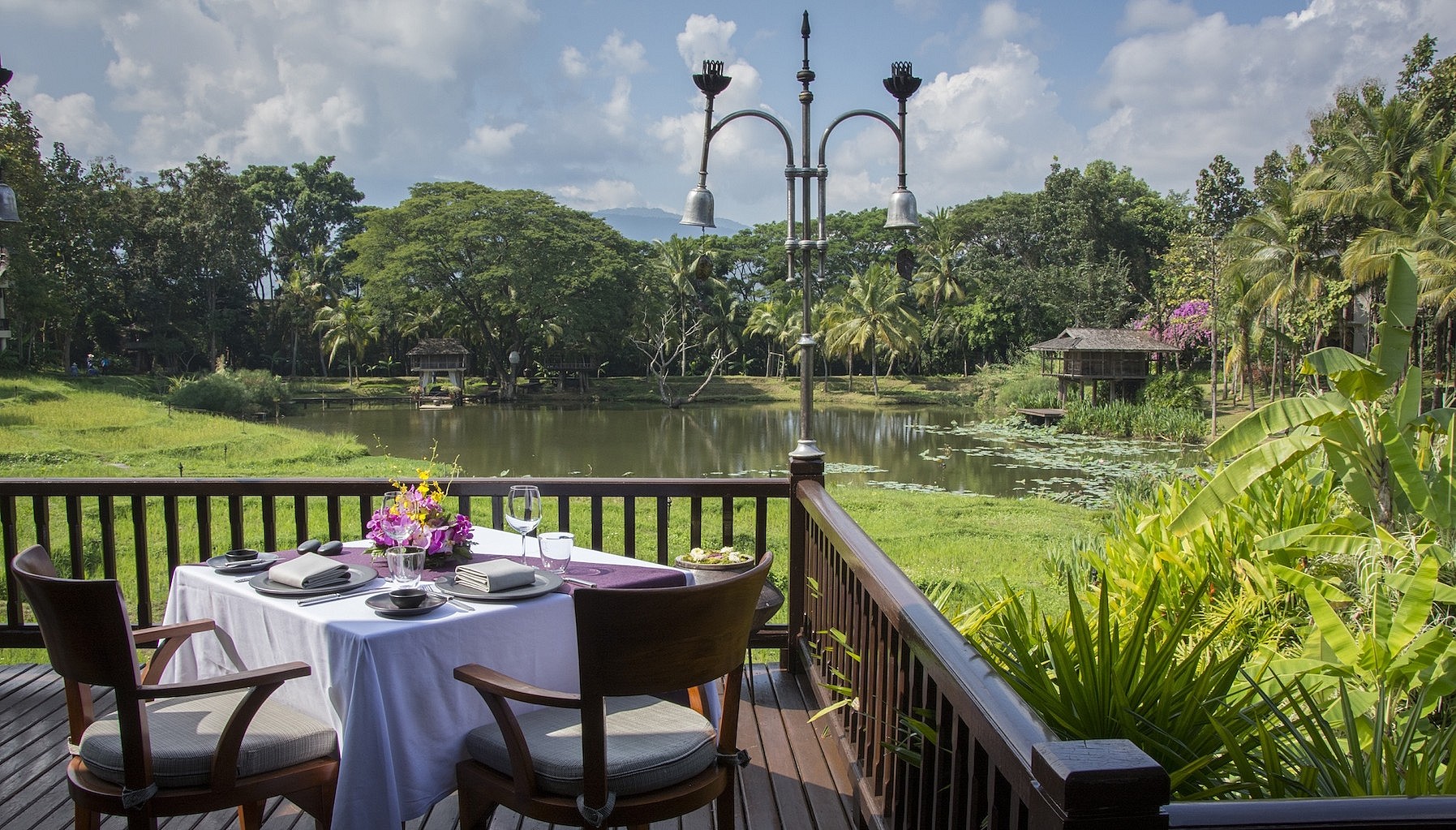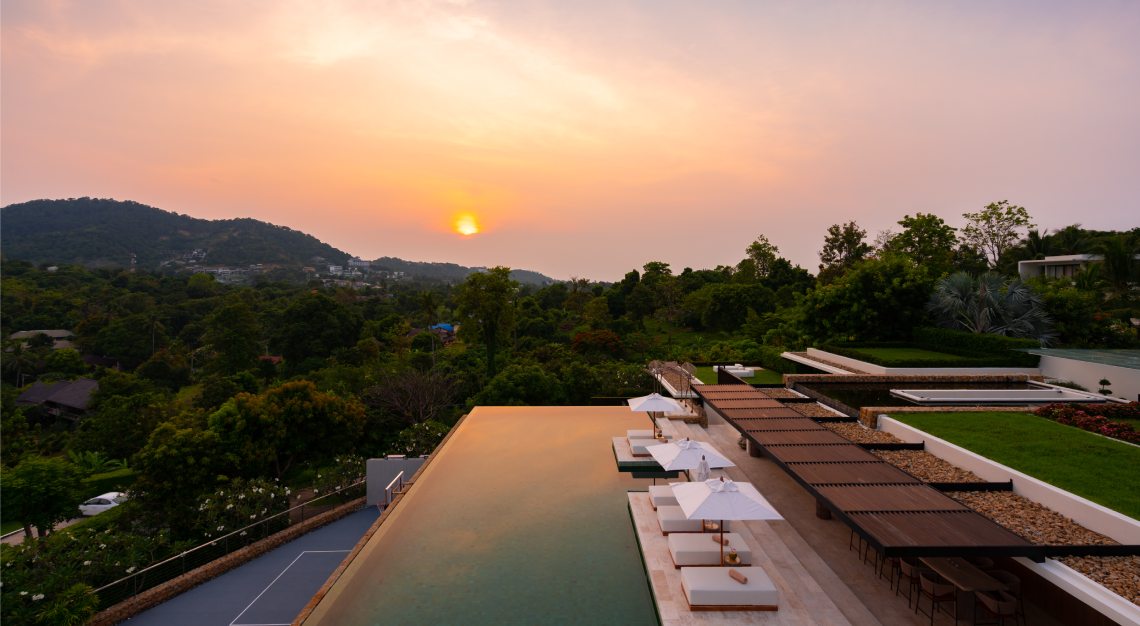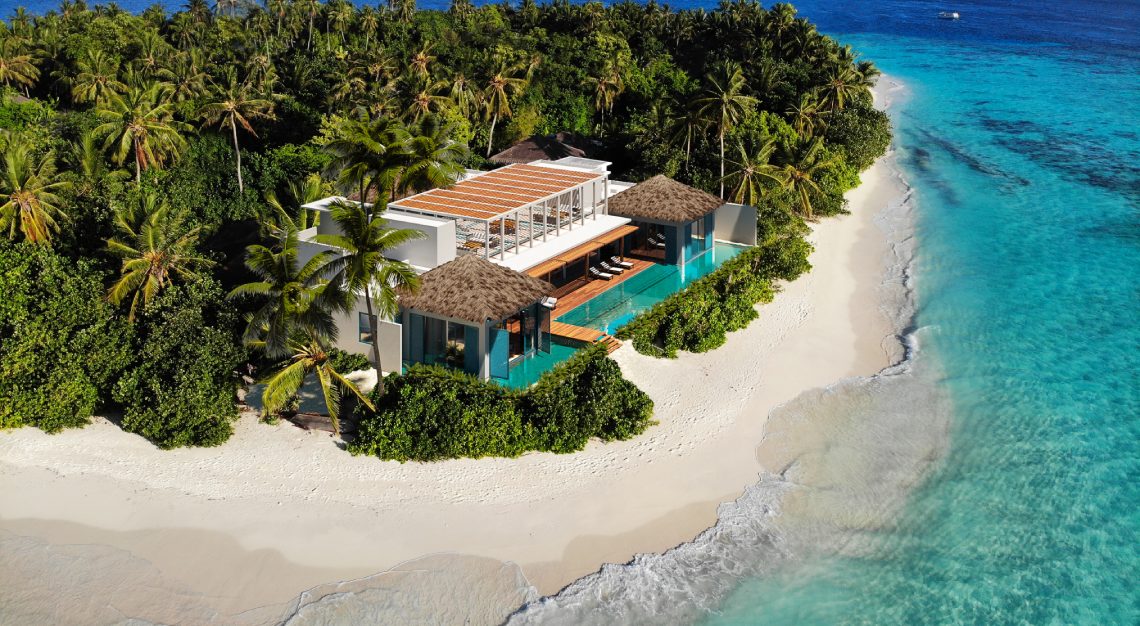Armed with new research about the inextricable link between our guts and our brains, this forward-thinking health resort is working to bring them into harmony
It might sound slightly blasphemous to visit Spain, the land of paella, pan con tomate and patatas bravas, and choose to dine on miso soup with a side of algae. But that’s my meal one evening at Sha Wellness Clinic, a health resort in Alicante whose terrace restaurant overlooks the Mediterranean Sea.
Instead of enjoying it with a glass of rose, I wash it down with a cup of umeboshi tea, a soupy brew made from the funky, salty Japanese plum that’s known to be an antibacterial superfood. The menu isn’t part of some newfangled scheme to shed kilograms. Rather, the macrobiotic drinks and dishes have microbiome-boosting properties that alleviate bloating and support gastrointestinal health, the target of the new ‘gut-health focused pack’.

The weeklong regimen—crammed with specialist consultations, colon cleansing and other stomach-healing treatments—can be added onto Sha’s existing programmes. It comes at a time when emerging research indicates that the link between the gastrointestinal (GI) tract and the brain may be far more crucial than Western medicine has previously acknowledged. Findings suggest that the digestive system heavily impacts our well-being and, when out of whack, accelerates anxiety and even depression.
The Sha retreat, which sits on the edge of a nature preserve and offers brilliant water views, opened in late 2008. Since then, it has made a name for itself with luxurious, nutrition-centric programmes designed to address everything from healthy ageing to weight loss. Stays can range from four days to three weeks and are administered in a state-of-the-art facility under the care of a team of physicians and alternative healers. Having experienced my own set of digestive trials and tribulations after picking up parasites during my travels, plus ongoing inflammation from a bad bout of dengue fever years ago, I figured a week of nutritional rigour and high-couldn’t hurt.

“In recent years, the knowledge of the gut microbiota has advanced by leaps and bounds,” says Mariel Silva, MD, one of Sha’s medical practitioners. “This research has led to an understanding of the importance of digestive health for optimal health. This means that if the function of the nervous system is altered, the function of the digestive system is altered, and the same happens in the reverse direction. As a consequence, when you have stress, you get dysbiosis (the medical term for an imbalance of bacteria), and when you have dysbiosis, you don’t tolerate stress.” One 2019 study, for example, found that mental tension and depression can alter the composition of gut bacteria, which in turn can release metabolites and toxins that cause a vicious cycle of problems. Another article published later that year highlighted an association between Western diets filled with processed foods, which already correlate with chronic illnesses such as diabetes and cardiovascular issues, and increased gut inflammation, which the authors argued can promote other inflammatory diseases.
“Countless people have walked around for years with gut issues,” says Maura Henninger, ND, a New York City-based naturopathic doctor who specialises in gastro health. “The explosion in research has helped immensely.” Increasingly, studies are showing how simple hacks such as changing our diets or taking probiotics can, in some cases, be more effective than prescription antidepressants. “Studies in laboratory mice have shown that certain probiotics can increase the production of GABA,” she notes, referring to a neurotransmitter manufactured by gut microbes that helps minimise feelings of fear and stress, “and reduce anxiety and depression-like behaviour”.
But while the scientific research and the quest for solutions to bring the gut and the brain back into balance are new, the link between mind and stomach is as old as humanity. “We have started to understand more about how they are intimately connected,” says Tim Spector, MD, a British epidemiologist and professor who has dedicated years to researching the microbiome and recently published a book, Food for Life: The New Science of Eating Well. “There’s a growing realisation that the food we eat plays a pivotal role in health,” he adds. “It is ultra-processed industrialised foods that seem to be wreaking havoc with our microbes and metabolism.”
Henninger points to integrative medicine, which takes a holistic approach that embraces biomedical and alternative solutions, as a successful way to improve digestive health. “Eastern medicine and naturopathic medicine have been used to treat gut issues successfully for generations. They’ve used tools like botanical medicine, diet and acupuncture. While they didn’t always have the definitive weight of research behind them, although they increasingly do now, they were inarguably effective. And they continue to be. Science is catching up.”

That Sha’s methods incorporate Western science and alternative medicine makes it well suited to fortifying the body’s microbiome. “You have everybody aligned to find your solution,” says Fernando Rojo, Sha’s general manager. “When guests come here, they have everything under one roof.” For the gut retreat, expect a comprehensive GI test upon arrival, in which a stool sample is sent away to a laboratory to identify specific bacteria, plus an intravenous liver detox containing glutathione and vitamin C, and colon hydrotherapy, which flushes out your intestines with gallons of water. Turnaround time for the GI test can be sluggish—a report takes two to three weeks—but a doctor will explain the results on a follow-up call. I also have appointments with a medical doctor, digestive physician and a psychologist (with whom I speak about emotional eating) and even undergo a form of lymphatic-drainage massage, conducted via machine, called pressotherapy.
Other treatments take a far more spalike approach outside the boundaries of Western standards—and everyone on staff is required to buy in. “We will never have a doctor who doesn’t believe that acupuncture or physiotherapy or osteopathy are medical practices,” says Rojo. These sessions include a hydro-energetic detox cure, which has
me marinating in a jetted bath with kelp cream and detoxifying herbal oil before being hosed down, and a ginger therapeutic compress, for which a hot, ginger-soaked towel is pressed onto my side—purported to be a way of cleansing the liver. At one point, I find myself lying on a sunbed while a therapist conducts a form of the
traditional Chinese medicine practice called moxibustion, lighting artemisia and holding it over my midsection for 15 counts. It doesn’t hurt, but the burning plant is close enough that I can feel the heat from its flame. She explains that the fire will help “stimulate the small intestine” and even admits: “This looks strange.” Odd or not, that night I have the best sleep I’ve had all week and wake up with a stomach as flat as the buckwheat pancakes I’ve grown accustomed to eating here.
What ties everything together at Sha is nutrition, its lodestar. The restaurant’s menu is devoid not only of meat, cheese, eggs, caffeine and sugar, but also of spicy and oily foods. The strategy here is less about calorie counting and more about reducing toxins. To that end, the chefs focus on highlighting local, seasonal and organic ingredients, and incorporate plenty of grains, vegetables and seaweeds. For someone who has long followed a keto or low-carbohydrate diet, reducing protein and ramping up millet and quinoa goes against every fibre of my being, so to speak. But everyone at Sha, even the waitpersons, is so hell-bent on the benefits of the macrobiotic diet that there’s little point arguing.
For each meal there are three menus available—which vary from gastronomic to calorie-restrictive— but the cooks also prepare off-menu dishes for patients whose nutritionists recommend individualised eating plans. In these cases, meals get tweaked over the course of the stay according to how you’re feeling. Coming to Spain without indulging in Manchego or a boozy carajillo coffee may sound boring, but eating at Sha is healthy fine dining at its best. In the kitchen, head chef Andrés Morán creates flavour-packed meals from ingredients that would taste like cardboard if not prepared correctly.
Tempeh is spun into ceviche, prawns are delicately draped with sheets of gluten-free pasta and drizzled with pumpkin miso, and almond- and rice-flour cakes are crusted with hazelnut. And while alcohol isn’t recommended, there’s a selection of fine wines on offer (though you have to sign a waiver if you want to deviate from the nutritionists’ orders).

On a warm Friday evening, as the rosy sun is setting over the ocean and turning the landscape golden, I hear the distant sound of people having a party. It’s an idyllic Mediterranean summer moment that only a glass of wine might improve. But rather than envious, I feel smug. No hangover for me! Besides, the clinic has its own party, with a Spanish guitarist stringing songs and serenading diners. Instead of toasting with vino, we raise shots of vinegar in water (served before a meal, I am told, to help the body metabolise an amino acid called homocysteine and move glucose out of the bloodstream to prevent sugar spikes). A woman behind me even orders a glass of champagne.
I don’t care to drink. After a full week of discipline, I feel both sharper and calmer, and I can finally button up my jeans without worrying I look pregnant—something I want to hang on to for as long as possible. I’m down to one caffeinated beverage per day, which I had negotiated with my nutritionist on arrival. My eyes look brighter, my skin is clearer and my stomach feels infinitely less bloated. I even start to look forward to my breakfast of miso soup, quinoa porridge with berries, and a second cup of non-caffeinated barley coffee with homemade almond milk.
But while I don’t want to end my good-health streak, I also don’t feel like everything will fall apart when I return to life in the city. “If you drink one glass (of wine) and you’re enjoying it with friends or family, or even yourself, that is important, too, because we have a very close relationship between the brain and the bowel,” Silva tells me when I break the news that abstinence doesn’t have a permanent place in my future. Happiness is good for the gut, she reminds me. “Just avoid anything processed!” she warns.
Unlike other wellness clinics with more rigid protocols, Sha’s flexibility makes returning to the real world easier. Guests go home with a nutrition plan and receive a follow-up call from a doctor. Test results and other data are handily saved in an app, making them easier to pass along to your local physician—and they’re a useful baseline for future visits. Which is key: the easy-does-it model means 50 per cent of visitors return, often many times. One afternoon by the pool, I meet a repeat guest who had previously gone to an Austrian clinic to detox and lose weight, which she describes as “lifechanging” but “way too tough” to do twice. Not only does she find the food at Sha much more enjoyable, but she also likes the relaxed approach, which she can incorporate into her daily life. (Plus, when she leaves, she’ll have a tan.)
While waiting at Alicante Airport for my return flight, I notice legs of Ibérico ham dangling at all the kiosks, but I’m not tempted. I’ve been primed with good habits that obviate the need to summon my willpower. I’m also in the early stages of healing my sensitive digestive system, which still needs a few more weeks to set straight. I have yet to receive the results from my dysbiosis test, but because I tested positive for parasites and SIBO (small intestinal bacterial overgrowth) in the past and am still having symptoms, the medical team is confident my issues haven’t been resolved. “Sometimes these things can take three or even six months to heal,” Silva says.
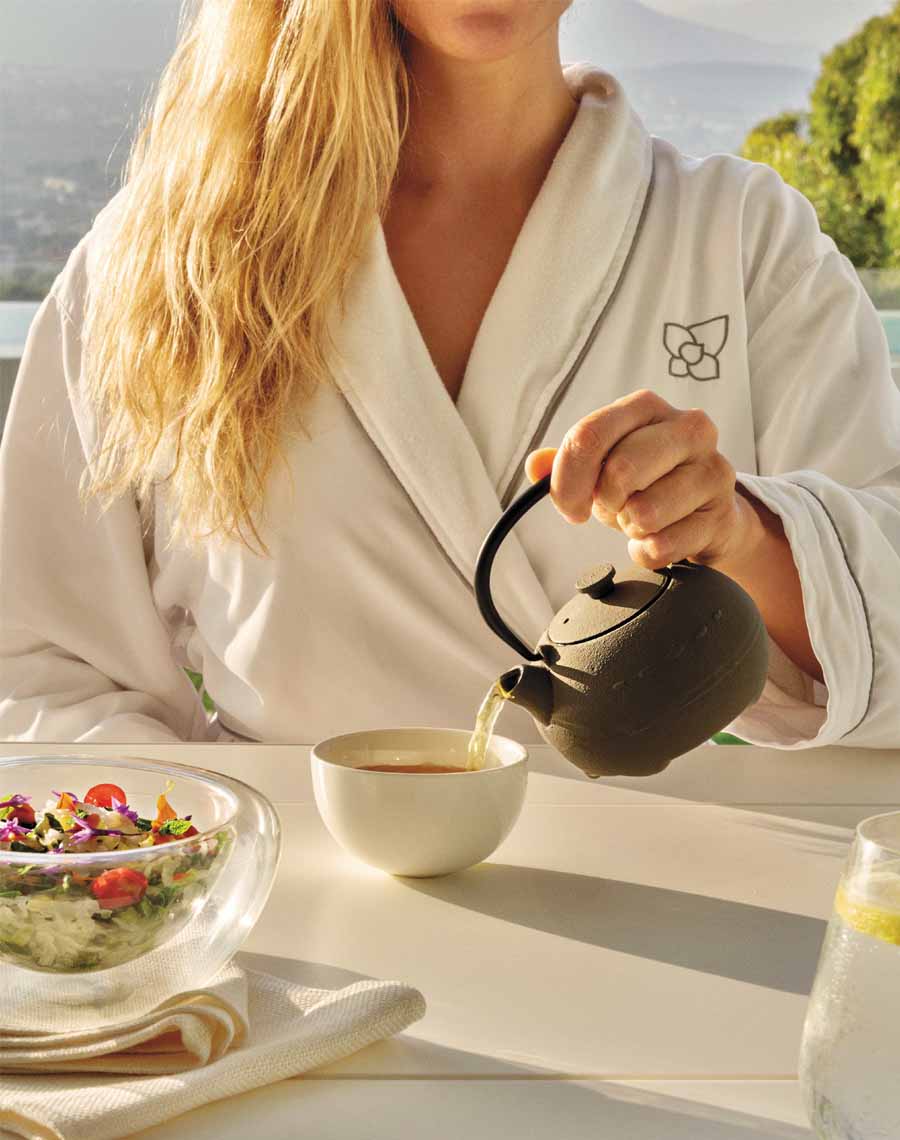
I am in it for the long haul. Back in New York, I receive my test results over a Zoom call. It had indeed found traces of both SIBO and parasites—unsurprising, considering my bloating is still flaring up (a nearly unavoidable symptom of SIBO). Silva gives me a six-month treatment plan that begins with antibiotics, followed by a course of supplements including lion’s mane mushroom and curcumin. She also instructs me to increase the levels of nutrient-dense foods such as avocados and blueberries in my diet and to continue exercising. I start making that porridge for breakfast and ramping up my intake of salmon at dinner. Though I’ll never be fully macrobiotic, I’m no longer terrified of farro and chickpeas.
There are moments when sticking to a single glass of wine feels impossible, especially when friends come to town the week following my return. But by and large, the habits I learnt at Sha have stuck. When I travel, I occasionally skip breakfast to let my digestive system rest. I generally avoid gluten and dairy, and I try to eat as much local, seasonal produce as possible. I also pack digestive enzymes and sometimes umeboshi-plum paste, a superfood Sha’s nutrition team swears by because of its high polyphenol concentration. No matter where I am in the world, I meditate most mornings and do yoga, take a long walk or hit the gym.
What Sha reminds me is that although a weeklong retreat can certainly fast-track gut health—while doubling as an amazing all-around respite—there are no quick fixes. Longterm solutions require a realistic, holistic approach along with healthy daily habits. And, sometimes, a glass of good wine.
Rates at Sha Wellness Clinic start at about US$6,100 for the seven-day Rebalance programme with gut-health add-on, plus about US$440 per night for a deluxe suite.
Other top clinics around the globe are also offering microbiome-oriented retreats. Here are four to book:
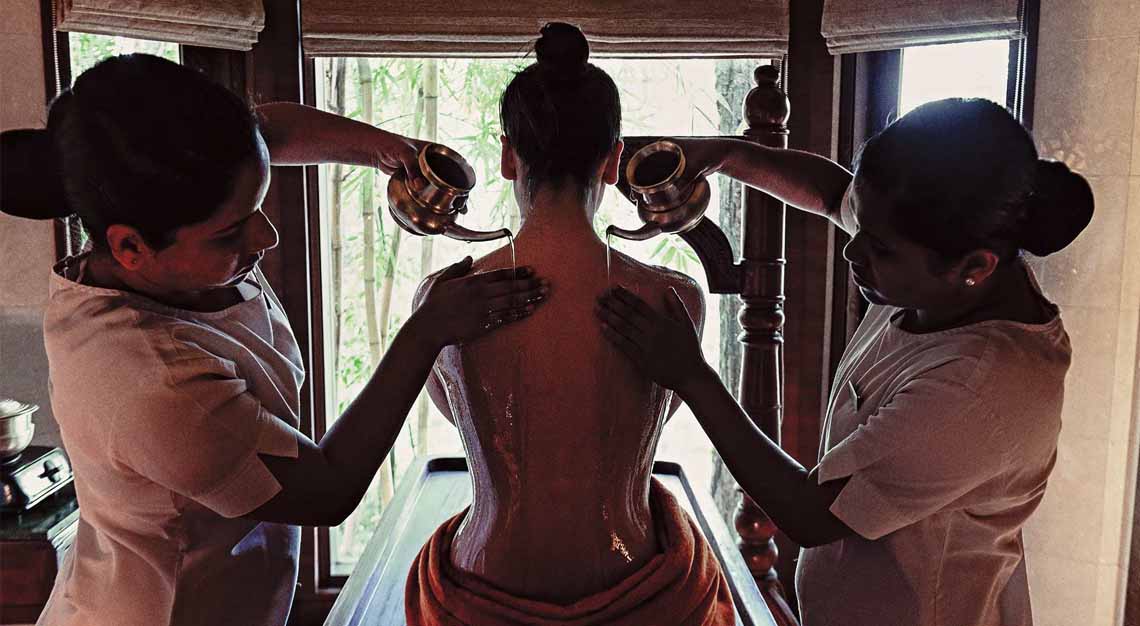
Ananda in the Himalayas – India
Using a more natural approach, Ananda in the Himalayas heals the gut, among other problem areas, through Ayurvedic treatments and medicine with a holistic programme overseen by a senior Ayurvedic physician specialising in gastro health and metabolic disorders. The spa is ensconced in a former palace in the foothills near Rishikesh, making the location just as relaxing. From about US$820 per night for seven- or 14-night programmes.

Lanserhof Sylt – Germany
On the weathered island known as the Hamptons of Hamburg, the year-old Lanserhof Sylt boasts a team of medical experts specialising in cardiology, neurology and dermatology, among other fields. Its gastrointestinal package includes a sonogram of the entire abdomen and comprehensive stool examinations. From about US$4,600 for a one-week programme, not including accommodations, which begin at about US$760 per night.
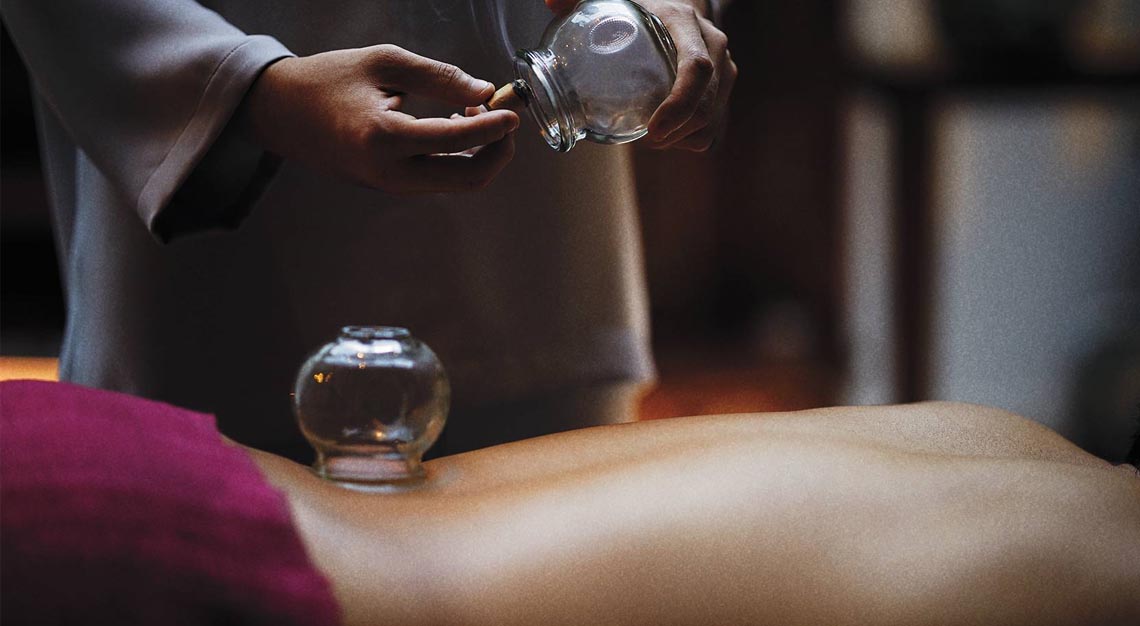
Rakxa – Thailand
This integrative wellness retreat in Thailand has a seven-night gut-health programme that blends medical technology with traditional regimens. Treatments include colon hydrotherapy and Chi Nei Tsang (a form of abdominal massage); guests also undergo a food-intolerance test and leave with a month’s worth of supplements. From 370,000 baht for a seven-night programme.
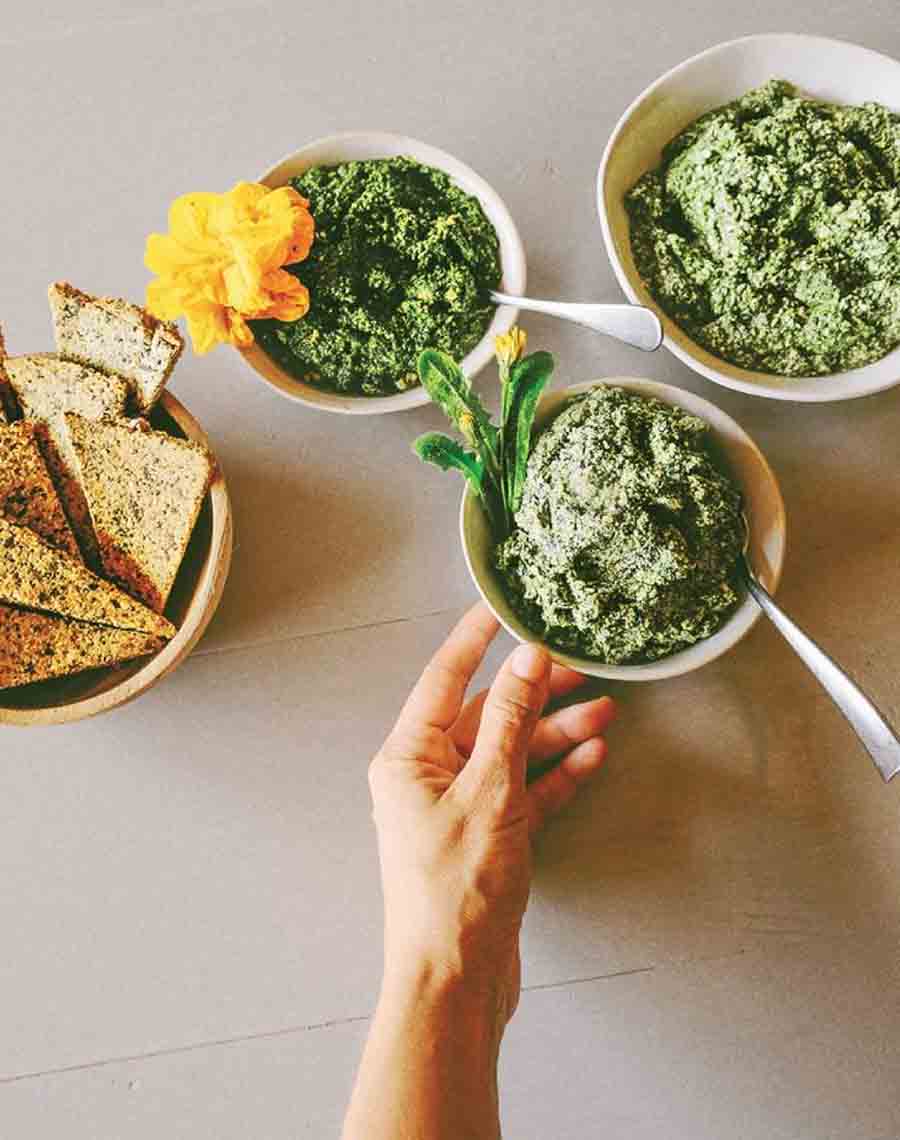
Oppidum – South Africa
With only nine spaces in each of three annual retreats (slated to double in 2024), Oppidum follows a holistic approach. It’s run by a team of healers including a medical doctor, and protocols range from trauma-release exercises to Chi Nei Tsang abdominal massage. There’s even a fermenting workshop where you learn to make probiotic foods such as kimchi, which can help create good bacteria. From 35,000 rand for a five-night programme.
This story first appeared in the November 2023 issue. Purchase it as a print or digital copy, or consider subscribing to us here. Illustration by Gary Taxali


